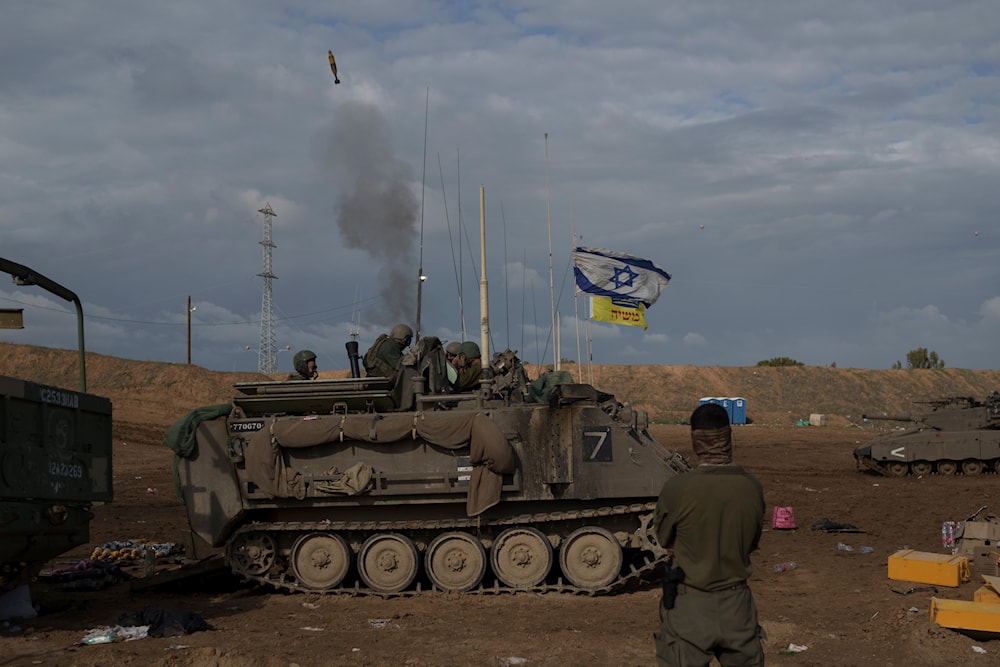Unsure 'Israel' will be able to fight Hezbollah: Ex-Mossad officials
A former Mossad official underlined her uncertainty that the Israeli occupation will be able to hold out on numerous fronts if a war breaks out with Lebanon.
-

Israeli soldiers fire a mortar shell toward the Gaza Strip, in a position in the Gaza envelope, occupied Palestine, January 3, 2024 (AP)
In a recent interview with Israeli public broadcaster KAN, former Mossad officials voiced several alarms about the Israeli occupation's ability to handle simultaneous threats from multiple fronts, particularly in light of potential developments in Lebanon.
The officials shed light on the internal challenges the country may face if another front is opened from Lebanon, emphasizing the critical need for strategic planning and preparedness.
One notable voice in the discussion was a former Mossad official who expressed uncertainty regarding the military's capacity to effectively engage on both fronts.
While acknowledging the potential challenges, the official emphasized the certainty that the internal front would encounter significant obstacles in confronting the expected firepower in the event of a new front opening up from Lebanon.
Reserve Captain Nadav Haetzani, a KAN political commentator, added a unique perspective by cautioning the settlers of the northern settlement of "Manara" against returning to their homes.
Haetzani cited the exposure to Hezbollah as a primary concern, advising against complacency due to the national acceptance of a situation caused by the Lebanese Resistance in the north.
Despite the evacuation of numerous individuals from their homes, Haetzani stressed that this acceptance was strategic, playing according to the rules set by Hezbollah, rather than an endorsement of the situation.
It is about more than UNSC 1701
Gail Shorsh, another former Mossad official featured on KAN, said the issue was related to more than the immediate concerns of UNSC Resolution 1701. According to Shorrsh, the firepower present in Lebanon holds paramount importance in the broader context.
While echoing the uncertainty regarding the IOF's ability to hold up on two fronts simultaneously, Shorsh underlined the significant challenges faced by the internal front in tackling the expected firepower should another front open from Lebanon.
Lebanese Hezbollah Secretary-General Sayyed Hassan Nasrallah underlined Wednesday that in the case of a full-scale war being declared on Lebanon, "We will have no limits, no restrictions, no rules of engagement, or boundaries."
"Whoever might think about going to war with us will regret such a decision. War with us will be tremendously costly," he stressed. "If war is declared against us, national interest will require us to fight the war until the very end," Sayyed Nasrallah underlined.
The speech left a major impact on the internal front in "Israel", and the Israeli media dealt with all seriousness of the threats it contained. In this context, Major General in the Reserves, Yaakov Amidror, warned that "the war in Lebanon is ten times more difficult than the fighting in Gaza with the Palestinians relative to the Home Front."
6,000 rockets to hit 'Tel Aviv'
Moreover, the Israeli "security" establishment warned, following its evaluation of the situation on the front with the Lebanese Resistance, that "in the next war in the North" there would be "6,000 rockets in the first days".
The warning was published by KodKod Group on their Telegram channel where they quoted the establishment saying, "According to the scenario, in one day of fighting, Israel will have to deal with the firing of thousands of rockets, and in the first days of the war, about 6,000 rockets will be fired at Israel."
The report, as published, then noted that "Later on" as the war extends over several days, "the number will decrease" gradually to reach about "2,000-1,500 rockets a day."
As such, the report emphasized that what is expected by Israeli "security" experts is that daily, "Israel" will be set to deal with approximately "1,500 attacks", which were characterized as "effective", on Israeli territory, given that "this is after subtracting the astronomical numbers...that will fall in open areas, and successful interceptions by the 'Iron Dome'."
On that note, Israeli occupation experts criticized the Israeli "Iron Dome" saying "with all due respect to it and its operators, there are very few chances that it will be able to show such high interception rates as we have been used to in the recent rounds of fighting in the South."

 4 Min Read
4 Min Read











